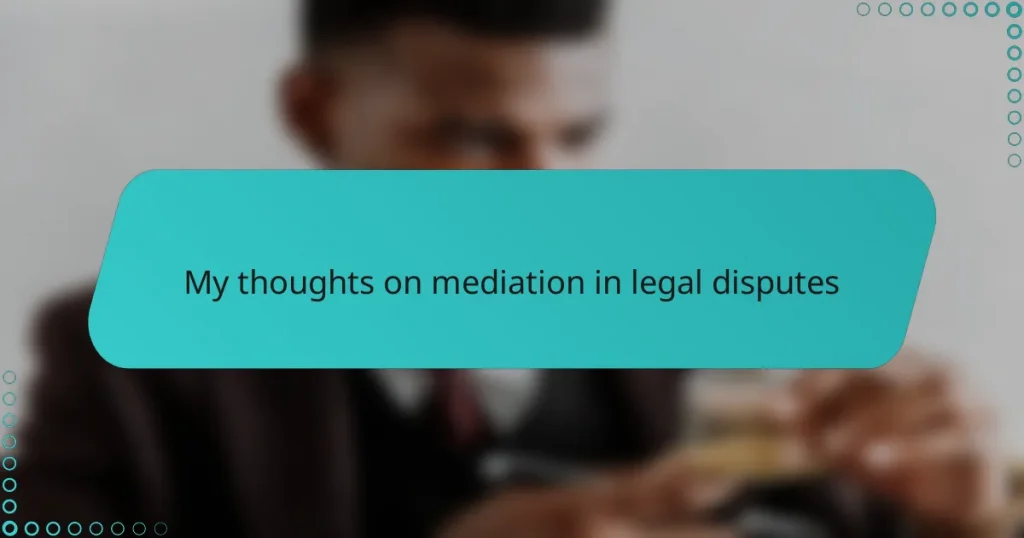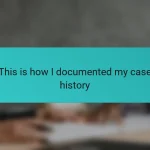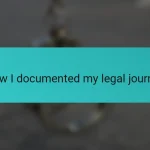Key takeaways
- Mediation fosters collaboration and preserves relationships by turning adversaries into partners in problem-solving.
- The process is more efficient than litigation, often resolving disputes in fewer sessions and reducing emotional and financial strain.
- Mediators need strong communication skills, empathy, patience, and adaptability to guide discussions effectively and manage emotional intensity.
- Mediation allows for creative, tailored solutions that address the specific needs of the parties, unlike rigid court-imposed rulings.
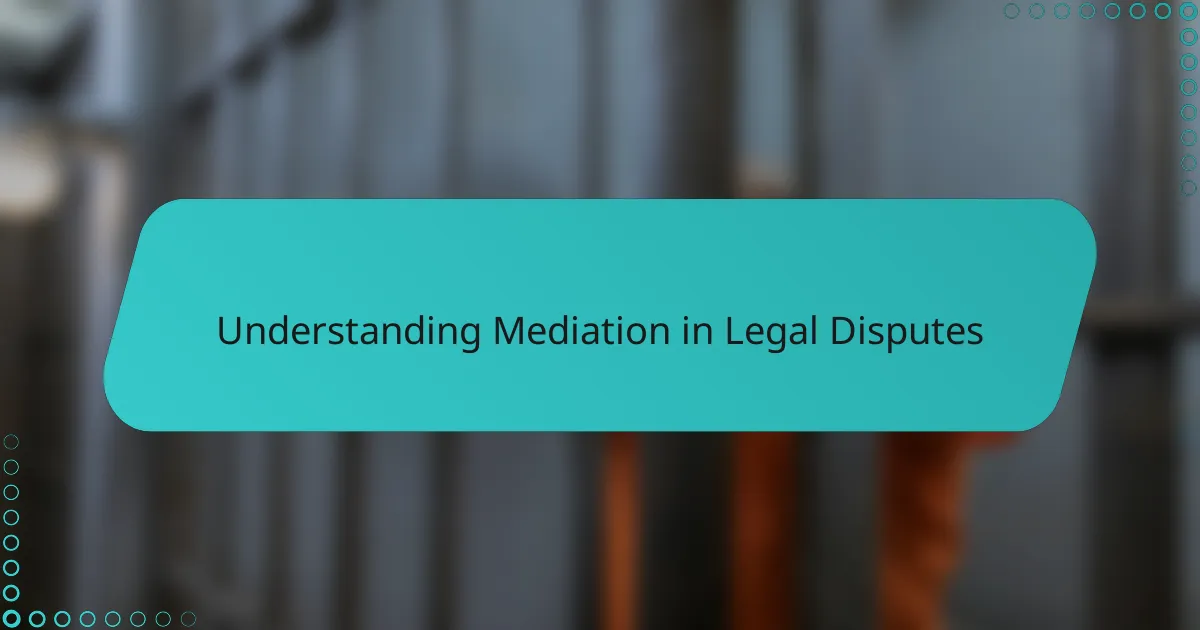
Understanding Mediation in Legal Disputes
Mediation in legal disputes is essentially a structured conversation guided by a neutral third party. From my experience, this process often feels less like a courtroom battle and more like a collaborative problem-solving session. Have you ever noticed how much more open people can be when they’re not staring down the barrel of a judge’s gavel?
What strikes me most about mediation is the human element it brings back to legal conflicts. Instead of relying solely on rigid laws or complex procedures, mediation allows individuals to express their needs and concerns directly. I recall a case where the parties seemed at a stalemate until the mediator helped them share their deeper frustrations, which completely shifted the dialogue.
But why is mediation valuable in the first place? In my opinion, it’s because it offers control and flexibility—things that traditional litigation often strips away. When disputes become personal or emotionally charged, sitting across from each other with a mediator can actually make resolution feel achievable rather than impossible.
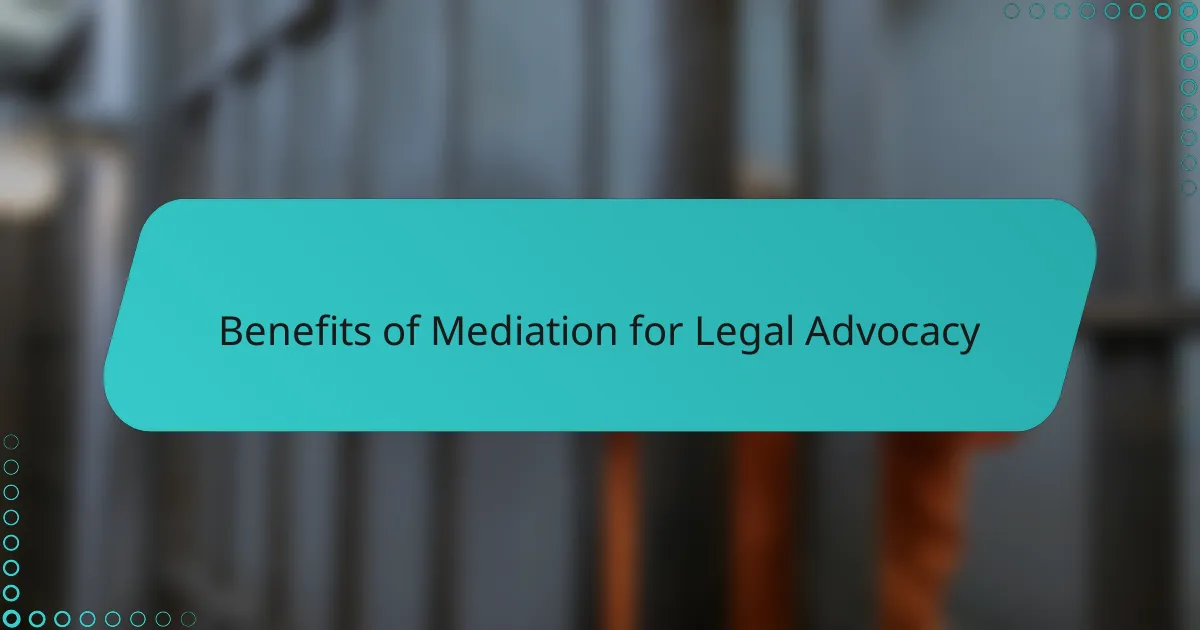
Benefits of Mediation for Legal Advocacy
One of the biggest benefits I see with mediation in legal advocacy is how it preserves relationships. In many cases, legal battles can leave lasting scars, but mediation encourages dialogue rather than confrontation. Have you ever been part of a negotiation where both sides actually left feeling heard? That’s the power mediation brings—it turns adversaries into collaborators.
Another advantage is the efficiency it offers. From my experience, cases that might drag on for months or years in court can often reach a resolution in just a few sessions of mediation. This saves not just time, but also reduces the emotional and financial toll on everyone involved. Isn’t it refreshing to think about solving conflicts without the endless legal back-and-forth?
Lastly, mediation allows for creative solutions that courts simply can’t impose. When you’re working with a mediator, you can craft agreements tailored to real-life needs, not just legal standards. I’ve seen parties find compromises that addressed their unique concerns in ways that a judge’s ruling never could. Doesn’t it make sense to resolve disputes in ways that truly fit the people involved?
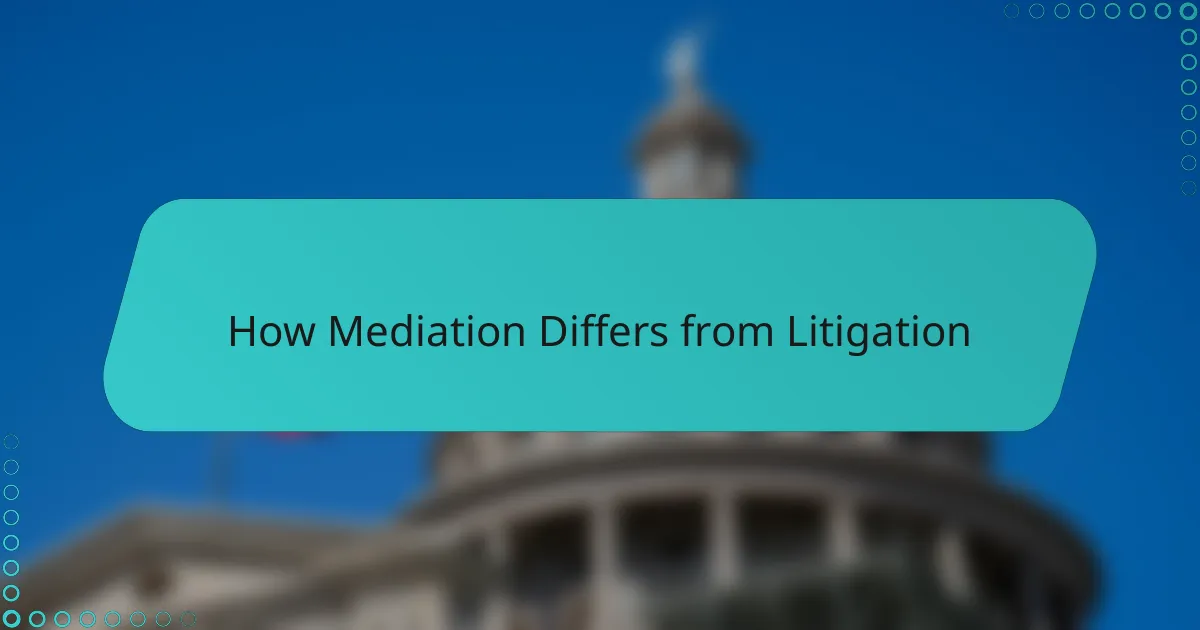
How Mediation Differs from Litigation
What I find most striking is how mediation puts the power directly into the hands of the disputing parties, unlike litigation where a judge or jury makes the final call. Have you ever felt powerless watching a case play out in court, waiting for someone else to decide your fate? Mediation flips that script, inviting you to shape the outcome personally.
In litigation, the process is formal, with strict rules and procedures that often feel rigid and cold. I remember sitting through lengthy court sessions where the technicalities sometimes overshadowed the real issues at stake. Mediation, by contrast, unfolds in a more relaxed setting where conversations flow naturally and people can speak openly without the pressure of legal formality.
Another key difference that stands out to me is timing. Litigation drags on, sometimes for years, while mediation seeks faster resolutions. Have you noticed how prolonged disputes can wear down even the strongest resolve? Mediation’s pace helps keep emotions from boiling over, making it a practical approach when you want to move forward instead of getting stuck in endless legal battles.
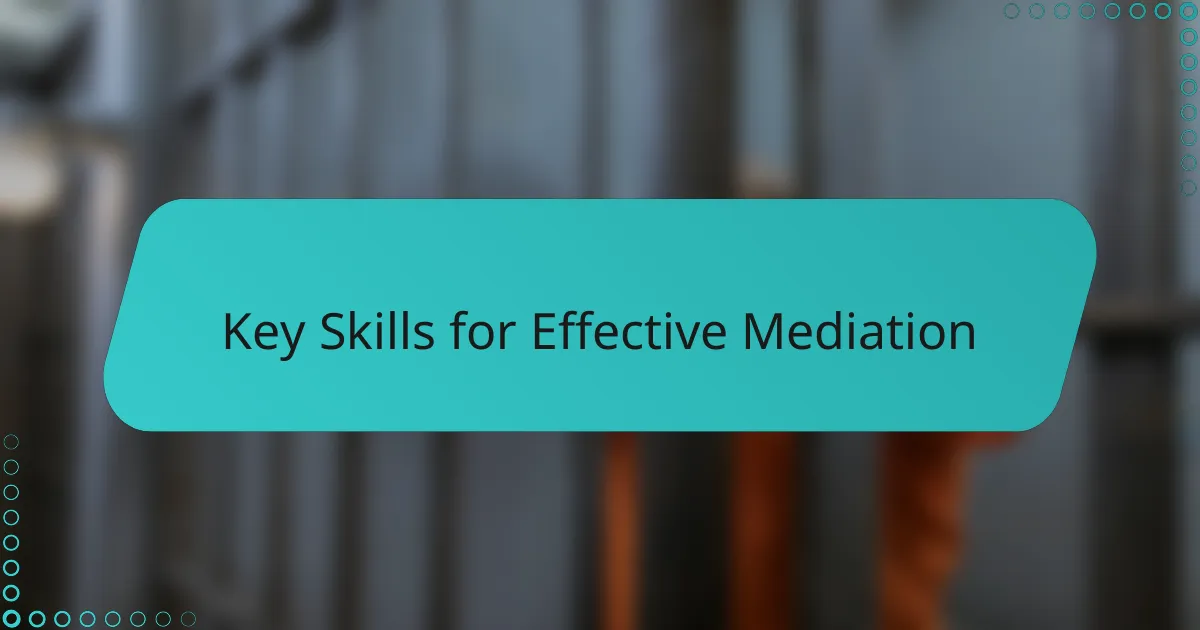
Key Skills for Effective Mediation
Effective mediation hinges on communication skills that go beyond just talking and listening. I’ve seen mediators who masterfully read between the lines—picking up on what’s said and what’s left unsaid. Have you ever been in a conversation where feeling truly heard defuses tension? That’s the subtle art good mediators bring to the table.
Empathy stands out as another crucial skill. When mediators genuinely put themselves in each party’s shoes, they create a space where emotions don’t derail progress but instead guide understanding. In one mediation I observed, the shift in tone happened the moment empathy replaced judgment—transforming hostility into cooperation.
Lastly, patience and adaptability are indispensable. Mediators often navigate unpredictable emotions and shifts in discussion. I remember a session that seemed stuck in a loop until the mediator changed tack, inviting creative problem-solving that neither side expected. Doesn’t it remind you how flexibility often leads to breakthroughs when rigidity blocks progress?
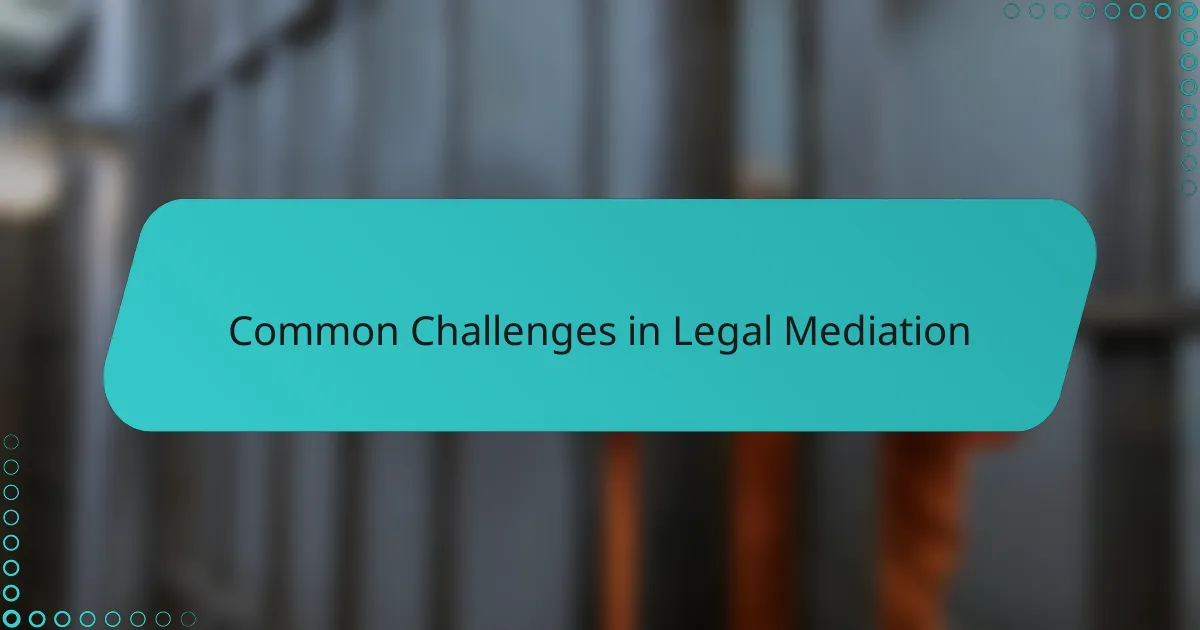
Common Challenges in Legal Mediation
One challenge I often notice in mediation is managing emotional intensity. People come to the table carrying frustration, anger, or even resentment, which can cloud their judgment. Have you ever been in a situation where emotions made it hard to focus on the actual issues? In mediation, it takes skill and patience to help parties move past those feelings toward constructive dialogue.
Another common hurdle is the imbalance of power between parties. Sometimes, one side may feel intimidated or overshadowed, which risks undermining the process. I recall a mediation where the quieter party struggled to voice their concerns until the mediator actively encouraged them to speak up. It made me realize how crucial it is for the mediator to level the playing field.
Lastly, reaching an agreement can be tricky when parties have entrenched positions or unrealistic expectations. I’ve seen cases where the desire to “win” blocks any meaningful compromise. Have you ever wondered how to break through that deadlock? Effective mediation often requires creative thinking and reframing interests to find solutions that genuinely satisfy everyone involved.
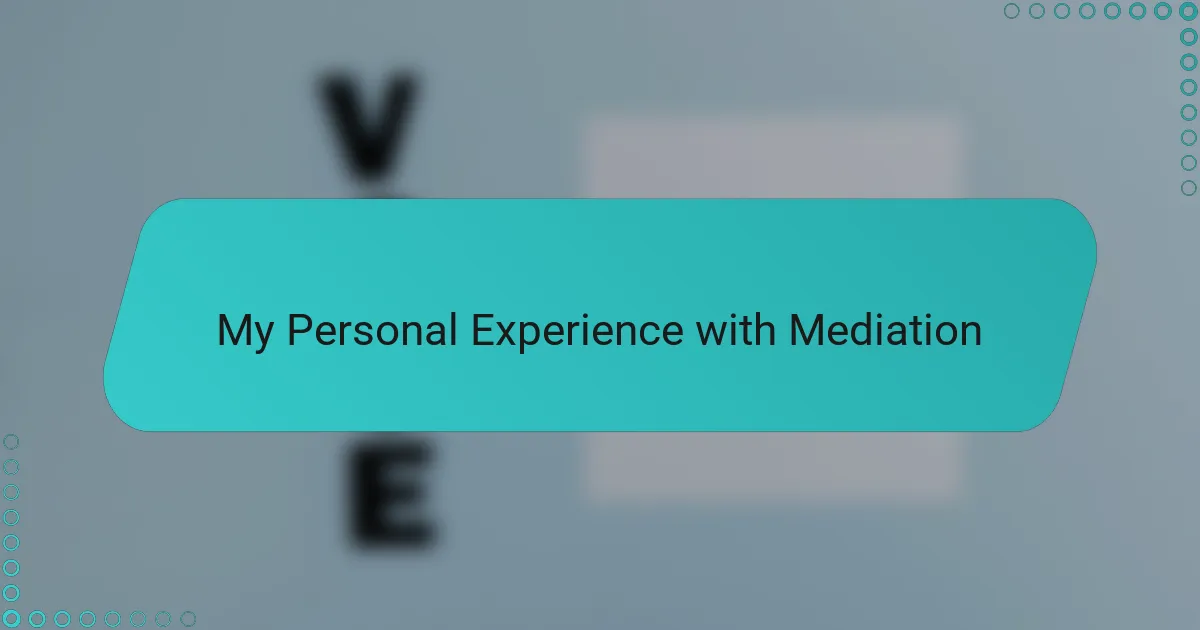
My Personal Experience with Mediation
In my own experience with mediation, I found it surprisingly transformative to step into a room where each person’s voice mattered equally. I remember one case where tension was palpable, yet as the mediator guided the conversation, the room slowly shifted from confrontation to collaboration. Have you ever witnessed that kind of change happen simply because everyone was given space to be heard?
There was also a time when I saw mediation reveal emotions that litigation would have buried deep. Parties shared feelings and concerns that no formal document or court ruling could capture, which made resolutions not only possible but meaningful. It struck me how this process brings out the very human side of legal disputes, something I hadn’t fully appreciated before.
Sometimes, mediation felt like a complex dance—balancing patience, listening, and gentle nudges to find common ground. One session seemed stuck in deadlock until a carefully framed question helped shift perspectives. Doesn’t it fascinate you how a single moment or word can unlock progress when a conventional approach might fail?
